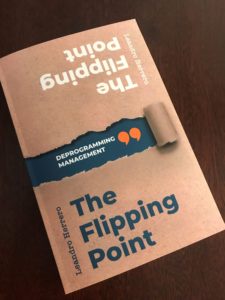I sometimes think that many global ‘one company’ initiatives are missing the point. The intentions are good: ‘look, we are all together in this, all in the same boat, one family, one set of values and a culture’. It sounds good. And at the same time: ‘we are diverse, respect many differences of opinion, sensitive to the markets and the local issues, we are all for local empowerment’. They are two narratives in conflict. I am not saying impossible to reconcile, far from it. But we need to acknowledge the tension. It is up to us to see it as a healthy or unhealthy tension. It is also naive to ignore the tension and more naive to try to suppress it.
The one company narrative is particularly ill-constructed when it is based upon an ideological position, not on rational needs. I know of a case where the European region of a company managed to create a unique product development structure within the global product development system. The USA headquarters felt very uncomfortable from the beginning despite the fact that the European system was not in conflict, but it represented a high value, innovative add on (incidentally featured in a business school case). The tension continued until the European idiosyncrasy was suppressed on behalf of the One Global Team. Read US. The One Global Team concept had no basis other than ideological and power control. And perhaps the inability of the so-called Global Leaders to manage a global structure. But lots of people were very happy with the killing and preferred to have a lower denominator, global system. Managerial incompetence was hidden in the closet.
The ‘us and them’ distinction is often quasi-toxic. It stresses the differences and implies some sort of conflictual relationship. However, if you want some identity and belonging, you are going to need a dose of ‘us and them’. The challenge for the leader is not to suppress the ‘us and them’ by decree in the hope that conflict will just evaporate, but make the most of the ‘us with them’. Build the with, retain the and.
Differentiation may be very healthy and helpful (may I remind you of the concept of brands?) or may be divisive and obstructive. There is a choice. And it requires the leader to navigate through what is common and is not, to find strength in the differences and to collaborate and be part of the bigger picture at the same time.
I have always said that acrobatics should be part of management education. OK, the mental one.
________________________________________________________________________________________________
Thank you to those of you who attended our webinar last Thursday. It was great to see so many attending and enjoyed the lively discussion.
Our Feed Forward Webinar Series – the organization now, under new management continues on 16th July.
Register Here! [1] Next webinar: The Myths of Company Culture on 16th July. Learn how to successfully mobilize your people for a purpose and change culture. Culture is the key to the complex post Covid-19 future in front of us.
To change to ‘the new normal’ we must think and act differently in the management of our organizations. Bring your critical thinking brain, switched on. It’s a serious business. It may also be fun.

________________________________________________________________________________________________
Don’t miss my new book: The Flipping Point – Deprogramming Management [2] – available now!
